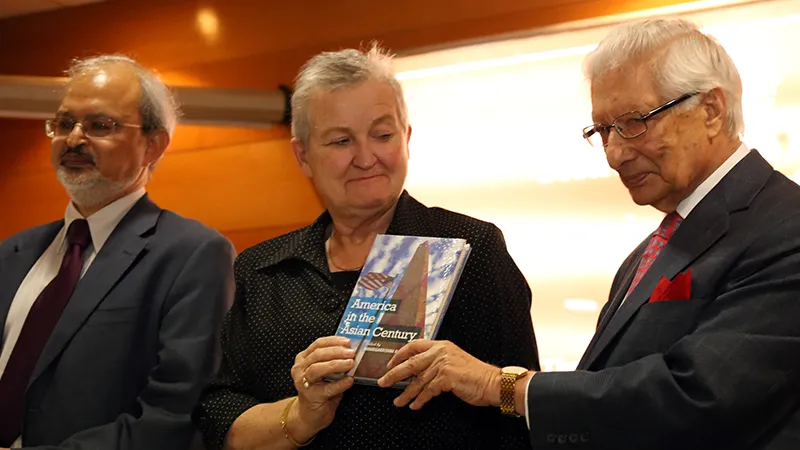-
CENTRES
Progammes & Centres
Location
The Ambassador of the United States to India, Ms Nancy J Powell, on Tuesday released ORF's new publication, America in the Asian Century. The book consists of papers by ORF scholars on US's policy and relations with all important Asian countries.

The Ambassador of the United States to India, Ms Nancy J Powell, on Tuesday released ORF’s new publication, America in the Asian Century.
The book, consisting of papers by ORF scholars on US’s policy and relations with all important Asian countries, is edited by Mr. M.K. Rasgotra, former President of ORF’s Centre for International Relations and a former foreign secretary.
The contributors included Prof. K.V. Kesavan (US-North East Asia), Dr. C. Raja Mohan (US-South Asia), Mr. Saeed Naqvi (US-Afghanistan), Dr K. Yhome (US-South East Asia), Dr Uma Purushothaman (US-China and US-West Asia), Dr. Ajish P Joy (US-Russia) and Dr. Angira Sen Sarma (US-Central Asia).
Welcoming the US Ambassador and all other guests, ORF Director Sunjoy Joshi said this competitive work is an amalgam of studies by ORF researchers the United States’ "evolving relationship of the young nations of the old continent".
Mr Joshi said the US’s relationship with the countries in this region will shape what is going to happen in this century which is billed as an Asian century.
Mr Rasgotra, who guided the project, said the research by ORF scholars found that US’ relationship and influences on countries of the region was benign, helpful and peaceful while China was looked upon as worrisome and with suspicion "for obvious reasons".
He said the US, on the other hand, is an "omni-national state" with special reasons for India whose 3.5 million nationals live in the United States.
Mr Rasgotra said the US is not only present in Asia but play a dominant role in stabilizing the region and helping create equilibrium of economic and military power, peace, stability and cooperation.
Mr Rasgotra drew the Ambassador’s attention to two important indicators of the study - one, to avoid getting involved in Asian wars and guide the Asian countries to bring about the equilibrium as stated above. Second, revive and reinvigorate the UN system which has become weakened. He said instead of holding back and behaving with restraint, the US should strengthen the system with new inputs and strengthen countries like India.
Releasing the book, Ambassador Nancy J Powell reiterated that India is the most important partner for the United States in the region. The Ambassador also stressed on the need for a strong US-India partnership to realise prosperity and progress in the region.
Talking about the importance of India in the US relations, the Ambassador quoted Assistant Secretary for South and Central Asian Affairs Robert Blake who had said: "To fully understand why South Asia matters, we need to first look at the Asia Pacific as a single geographically coherent space; one that not only ends on our own shores, but also expands westward to encompass the Indian subcontinent. Much of the history of the 21st century will be written in this broader Asia-Pacific region, projected to become home to over 5.2 billion people by 2050. That history will have a profound impact on the people and the economy of the United States."
The Ambassador said Blake had noted that any discussion of South Asia has to start with India. It is one of our most trusted and valuable partners in the region, and really the foundation upon which greater regional economic cooperation and expansion will be built.
"I will also echo him when I say that "as we go about the much-talked about ’Asia rebalance’, there’s no more important partner for the United States in the region than India," the Ambassador said.
The Ambassador said the US-India relationship is broader and deeper today than it has ever been. She said this is evidenced by all of the areas in which we cooperate. She noted that while our trade is approaching $100 billion, there was a time when it was just around $ 3 billion a year. "India has leapt from our 25th largest trading partner to our 13th largest trading partner in just over a decade. I do believe that bilateral trade can increase far beyond $100 billion annually, but there are barriers that must first be addressed, as many of your own reports have stated," the Ambassador said.
Talking about the importance of the relationship, the Ambassador said while the US Vice President Joe Biden and Secretary of State John Kerry were in India this summer, Indian Prime Minister Manmohan Singh will visit the US in September.
Complimenting ORF for its work, the Ambassador said this publication is an example of the key contributions, a compilation of essays that analyse U.S. policies, past and present, and our history in Asia in order to examine what the U.S. role will be in this region in the 21st century.
Complimenting Mr Rasgotra for asking the right questions in the project which brought out the right answer of the enduring relevance of US in Asia, Dr C. Raja Mohan, Head of ORF’s Strategic Studies Programme, said now India-US relations have moved a long way, changing the mindsets in both the countries. Dr. Mohan also pointed out that the US has better relations with all the major Asian powers than they have among themselves. Noting that much is yet to be done as stated by the Ambassador, he said it is the job of think tanks and scholars to do more research to find ways to consolidate US-India relationship.
"The text of speech of Ambassador Nancy Powell"
The views expressed above belong to the author(s). ORF research and analyses now available on Telegram! Click here to access our curated content — blogs, longforms and interviews.